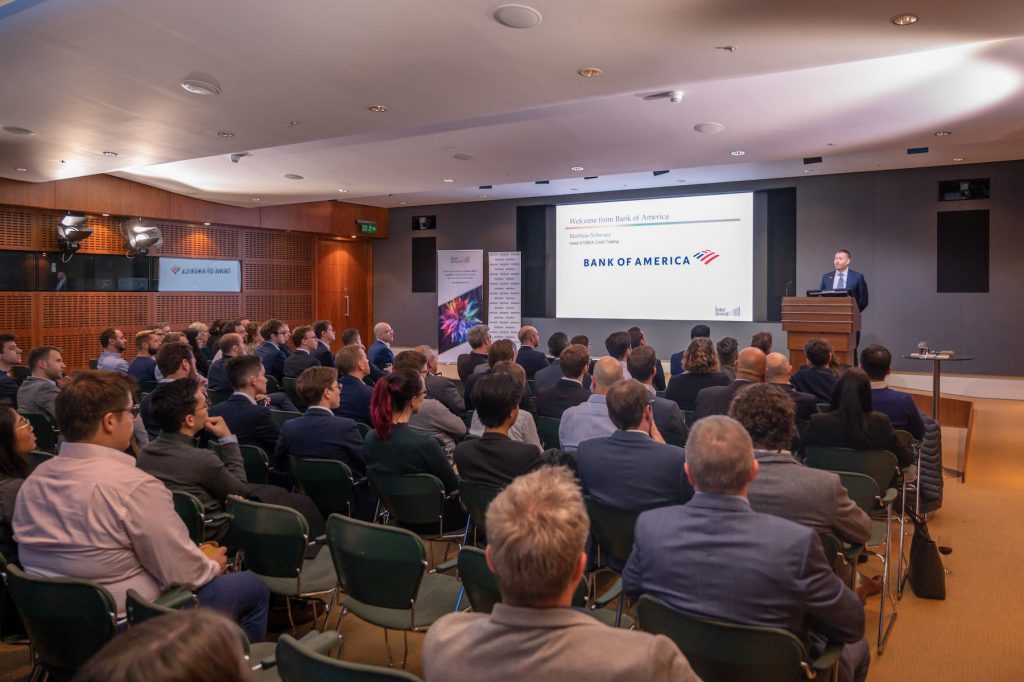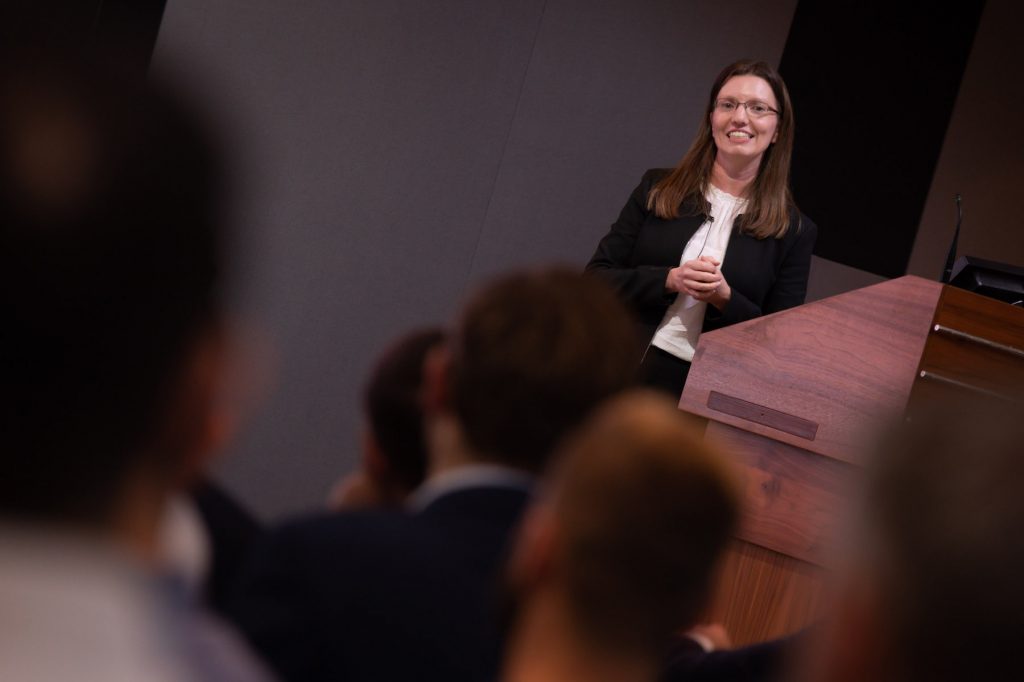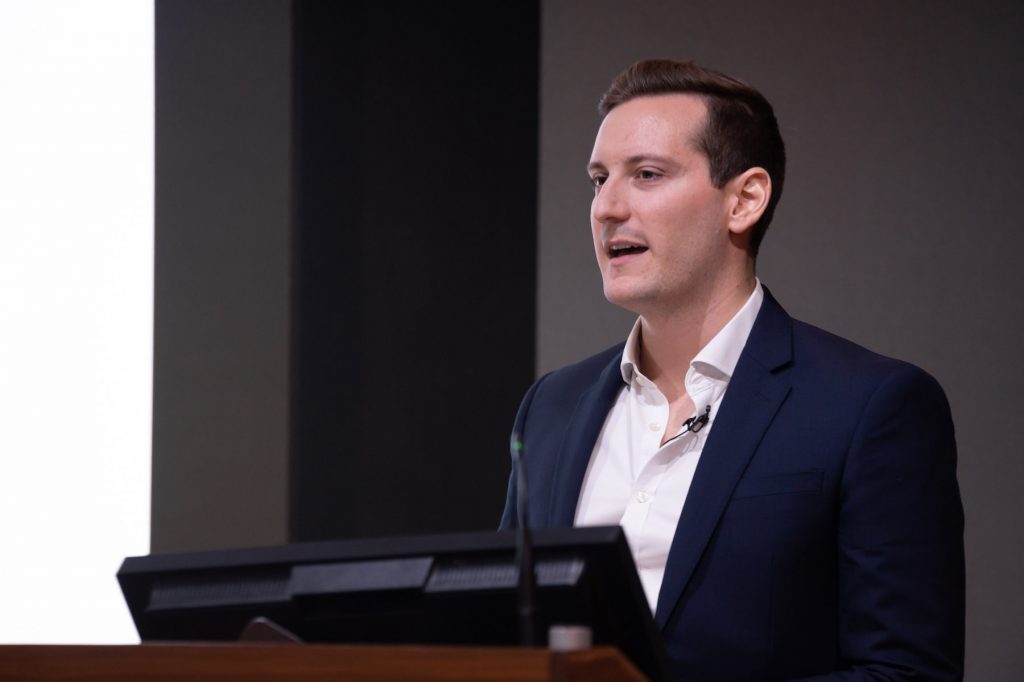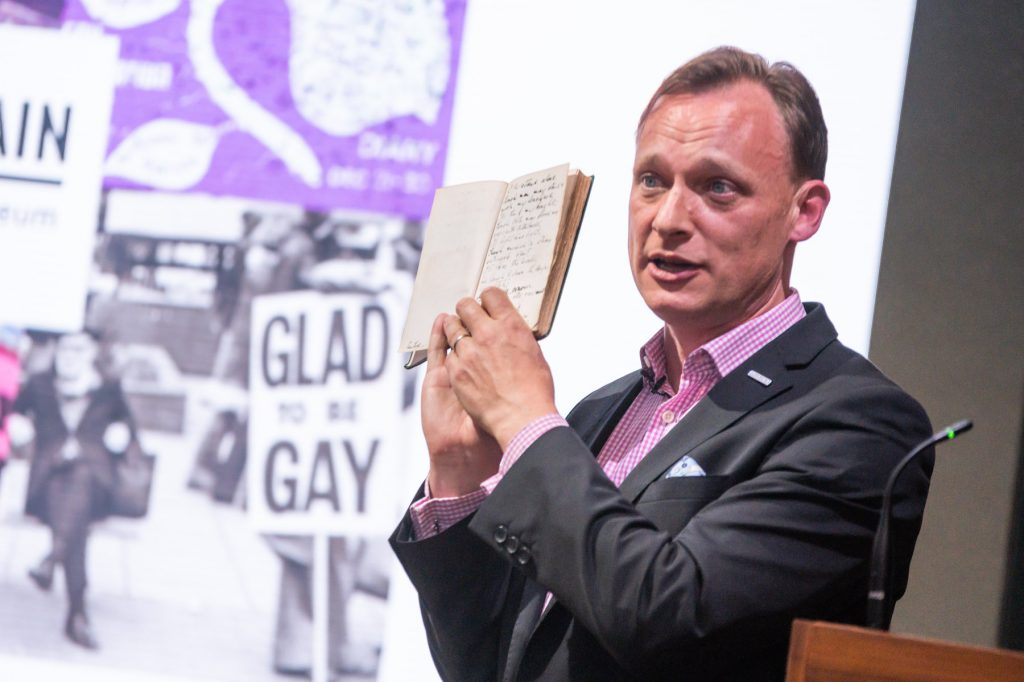Alan Turing – Building a shared LGBT history
On 24 October, we welcomed over 100 people from across the investment industry, our member firms and supporters of Queer Britain to celebrate Alan Turing becoming the first LGBT+ person to be featured on a UK bank note.
The audience heard from a fascinating range of speakers who spoke about the importance of organisations such as our own, how Alan Turing came to be chosen for the £50 note, the history of the de-criminalisation of sex between men, and why we need an LGBTQ+ museum. Below are some highlights from the night.
Thank you to our generous hosts, Bank of America, for supporting this event and to Matthias Schwarz for setting the scene.
You can download a PDF of the presentation here

About InterInvest – Deon Pillay, Co-Chair of InterInvest
Deon gave the audience a brief history of our organisation and focused in on why events like this still matter. He ended with a favourite quote of ours here at InterInvest, which sums up our approach to the work we do.
“I am only one, but still I am one. I cannot do everything, but still I can do something; and because I cannot do everything, I will not refuse to do the something that I can do.” – Edward Everett Hale
Keynote – by Sarah John, Chief Cashier at the Bank of England

We were delighted that Sarah John, the Chief Cashier at the Bank of England, and the woman whose signature will grace the £50 note, was able to join us in person to talk us through how Alan Turing came to be selected.
Sarah gave a brief overview of what it means to be ‘Chief Cashier’ – which she encapsulated as the “responsibility to make sure that people have banknotes that they can use with confidence.” That includes everything from the design of a bank note, through production, issuance, and finally the destruction and recycling of them.
One of the first questions Sarah was faced with when she took over the role was who to put on the new £50 note? And for Sarah, this was particularly significant as it’s the first bank note she has stewarded through its entire lifecycle.
The selection process
- The selection process was launched in November 2018 at the Science Museum, where the Bank asked the British Public to “Think Science!” and help select a scientist for the next £50 note
- The Bank had an astonishing 227,000 nominations in response, which created a list of 989 eligible candidates
- The Bank Note Character Advisory Committee analysed the candidates and whittled it down to a shortlist of 12. The committee comprises two internal members (inc Sarah), and nine external members, four of whom are scientists
- The shortlist was given to Bank of England Governor, Mark Carney, to make a final selection
Why was Alan Turing chosen?
The majority of people know Alan Turing for his Enigma code-breaking work at Bletchley Park during World War II. However, for Sarah, it is his legacy in the world of computing that she finds most compelling and the reason she feels he deserves to feature on the £50 note. The array of technology available to us, and the journey from machines the size of a house to the pocket-size devices we use today, all stems from an idea that Alan Turing had in the 1930s. His idea and his legacy have transformed our lives, and that is what is being celebrated.
Sarah also talked through the intricacies of the design, which includes a quote from an interview on computing published in The Times, where Alan Turing evidenced an incredible foresight: “This is only a foretaste of what is to come and only the shadow of what is going to be.”
A second reason to applaud Alan Turing’s selection
While Alan Turing’s scientific achievements are being celebrated, Sarah also highlighted his sexual orientation as a key reason to celebrate his inclusion on the £50 note, saying: “I’m also incredibly proud that Turing will be the first gay man to be depicted on a Bank of England note. And it’s in fact all the more poignant given the horrific treatment that Turing received as a result of his sexual orientation.”
“I’m also incredibly proud that Turing will be the first gay man to be depicted on a Bank of England note.”
After running through a brief description of his arrest, conviction and loss of career, Sarah ended with a more positive perspective: “I like to think we’ve come a long way since then but there’s still a long way to go. I very much hope, though, that by depicting Turing on this note it will serve as a reminder that prejudice has absolutely no place in UK society today.”
“Prejudice has absolutely no place in UK society today.”
Disregarding historical convictions and cautions for sex between men – by Josh Little, Associate, Allen & Overy

While Sarah talked to the computing legacy Alan Turing left, Josh moved on to his other legacy – the legal legacy and the disregarding scheme that we have in England and Wales. Today, this is available to any man who was cautioned or convicted of the criminal offences of buggery or gross indecency – as Alan Turing was. It is important among the celebration, to reflect on the laws that so affected his life, career and played a part in his early death at the age of 41, in 1954.
Josh did a great job of distilling almost 500 years of British history of the crime of homosexuality into just 15 minutes. The timeline shows just how recent the legislative changes were, and that within living memory in the UK it was a crime to be gay.
A potted history of the (de)criminalisation process
- 1533 – Henry VIII brought in the first ‘buggerie’ laws, criminalising homosexuality and making it punishable by death
- 1835 – James Pratt and John Smith were the last British men in England and Wales to be executed for buggery on the testimony of their landlord who had spied on them through a keyhole
- 1861 – ‘sodomy’ was still a crime but a change to the law meant it was no longer punishable by death
- 1885 – with sodomy being hard to actually prove, the ‘Labouchere Amendment’ introduced the more easily convictable crime of Gross Indecency. This was the law under which Oscar Wilde was tried and sentenced to hard labour in 1895
- 1952 – Alan Turing was convicted of gross indecency. As punishment he was offered a choice between chemical castration or imprisonment. He chose the former.
- 1954 – Alan Turing died allegedly by suicide
- 1956 – Sexual Offences Act renamed previous offences as ‘indecency between men’, and introduced a new offence of ‘soliciting for immoral purposes’. This was used, Josh commented, from the ‘50s until its repeal in 2003 “as a means to persecute gay men”
- 1967 – the first significant decriminalization date when the law changed to allow same-sex conduct between two consenting men, but over the age of 21 and ‘in private’.
- 1988 – another backwards step with the introduction of Section 28 and in response in 1989 Stonewall was founded
- 2003 – Sexual Offences Act was amended and the solicitation law was repealed
- 2009 – Prime Minister Gordon Brown apologized for the way that Alan Turing was treated
- 2012 – Protection of Freedoms act introduced the disregarding scheme
- 2013 – Alan Turing was given a posthumous pardon by the Queen, and same sex marriage becomes legal
The ‘Turing Law’
In 2015 – and as Josh said, the reason Alan Turing’s legacy is pivotal in this story – built on momentum from the public and an online petition, the Conservative government made a manifesto pledge to “build on the posthumous pardon … with a broader measure to lift the blight of outdated convictions of this nature.”
Josh and his team spent some time working with Stonewall and the Home Office, resulting in the ‘Turing Law’ which amended the somewhat flawed and limiting 2012 disregarding scheme.
“It’s still not doing enough to right the wrongs of those convictions”
However, even now there are issues. Between October 2012 and October 2019 (data from both old and new schemes), there were 468 applicants for 686 convictions, but of that, only 189 convictions have been successfully disregarded. Given there were 15,000 men living with convictions in 2016, the scheme doesn’t seem to be achieving what it was set up to do. Josh commented: “It’s still not doing enough to right the wrongs of those convictions … I do think going forward there will be more momentum.”
Some positive news?
Josh ended with some good news. In October 2019, the Historical Sexual Offences Act came into force in Scotland. Wider in scope than the English scheme, it includes any offence that “regulated or was used in practice to regulate, sexual activity between men”.
Discretion has been introduced into the process, giving the Scottish government the freedom to decide whether each application is something they wish to disregard.
“I think that is the perfect compromise position,” Josh concluded.
Joseph Galliano, CEO, Queer Britain

Joseph Galliano is the CEO and co-founder of Queer Britain, which is a campaign and charity working to establish Britain’s first national LGBTQ+ museum. He spoke to the power of artefacts and the importance of being able to recognize oneself in the cultural landscape.
After giving a synopsis of Alan Turing’s life and circumstances around his death, Joseph posed the question: “How different would things have been for him – and for me – if he had been embraced and celebrated by the establishment; by the very establishment that he had saved? It certainly would have been completely different for me if I had had a hero like that to look up to.”
“This book saved my life…”
Joseph spoke about his own childhood, and the fact that growing up, an “anxious, suburban teenager, quickly coming to the realization he wasn’t like any of the boys in his class,” he couldn’t see himself reflected anywhere in society. Then he found a book in a jumble sale. “This book saved my life…” he said, holding up a 1909 copy of De Profundis, written by Oscar Wilde during his incarceration in Reading Gaol. And inside that book was an inscription that read: “I’ll face the world and laugh to scorn the scoffers of my state, and I will conquer.”
As Joe saw that text, he understood the person who had written it, and he recognized himself in those words. That moment was life-changing; it ended the desperation of never seeing himself represented in his culture.
What will having an LGBTQ+ museum mean – what is its purpose?
- It will be a national museum and is for everybody
- It’s about taking the LGBTQ+ community’s stories, treasuring and preserving them and educating people about them
- It’s about engaging allies – LGBTQ+ individuals being able to share with, and educate family and friends
- It’s a forum to rescue or uncover LGBTQ+ stories that have been buried – purposely or not
- It’s about looking backwards, understanding the present, and creating the best possible future
To find out more about the work of Queer Britain, or work with the campaign and charity, you can email joseph.galliano@queerbritain.org.uk, sign up to the Queer Britain mailing list at www.queerbritain.org.uk, join its Patron Circle, or be part of its membership scheme.
Thanks go to: words: Suzanne Whitlock, Mark Charmer; photography: Plainview Media


